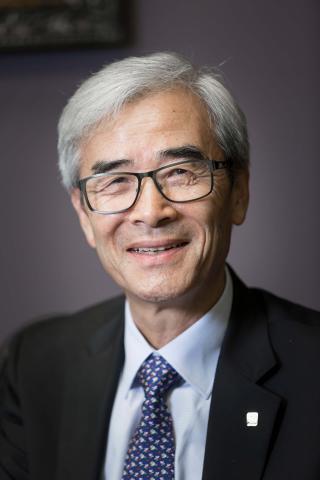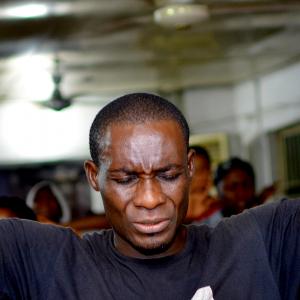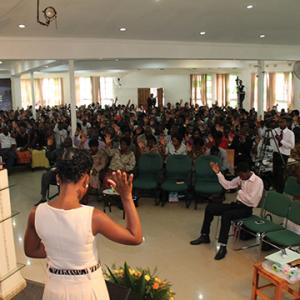
Wonsuk Ma, founder of the Asian Pentecostal Society, is distinguished professor of global Christianity at Oral Roberts University in Tulsa, Okla.
Posts By This Author
When the Spirit Comes Down
Why Pentecostalism is becoming a force for social change around the world.

Ariyo Olasunkanmi / Shutterstock.com
IN 1906, a few hundred people were present at Azusa Street Mission revivals in Los Angeles, which are regarded as the beginning of modern Pentecostalism. A century later, Pentecostal/Charismatic Christianity claims about half a billion adherents worldwide.
Around the world, where work for change is happening, it’s often Pentecostals in the middle of it.
For example, Donald E. Miller and Tetsunao Yamamori, two scholars based at the University of Southern California, examined flourishing churches in the global South that were involved in social issues (churches that were indigenous to their areas—that is, not reliant on foreign resources). To the surprise of Miller and Yamamori, authors of Global Pentecostalism: The New Face of Christian Social Engagement, 85 percent of them were Pentecostal and Charismatic churches.
What motivates these churches to roll up their sleeves and get their hands dirty in serving their neighbors? Is it poor economic conditions? If the answer is related to context, why are these Pentecostal churches more engaged and proactive than their Catholic or Protestant counterparts?
There are several key Pentecostal beliefs that encourage response to social challenges:
1) Called: God touches us!
The Pentecostal movement is best characterized by personal experiences with God. Often supernatural in nature, these encounters with God are described as “crisis experiences,” and they tend to revolutionize the believer’s faith, attitude, behavior, and life.
For example, the Yoido Full Gospel Church in Korea publishes Shinang-gye (World of Faith), a popular monthly magazine that features testimonies of divine healings and miracles. Such testimonies affect others and reinforce a key value among Pentecostals: Most human problems are spiritual at their core.
This assumption has significant implications. First, in Pentecostal worship such an encounter with God is expected, encouraged, and facilitated. Songs, preaching, prayer, altar call, and other components of Pentecostal worship lead worshippers to enter into a “holy ground” where one meets the loving and powerful God. This makes Pentecostal worship dynamic and vibrant.
Circles of Hope for Tackling AIDS
Northmead Assembly of God Church is just like any other Pentecostal megachurch, except when it comes to HIV screening and its AIDS ministry.
Northmead Assembly of God Church in Lusaka, Zambia, is just like any other megachurch in the world’s megacities. About 1,500 worshippers gather for each of the two Sunday worship services. The music is emotionally uplifting, and Bishop Joshua Banda’s roaring preaching barely keeps members of the audience in their seats. Frequent amens and hallelujahs compete with the preacher’s increasing excitement. In every way, this is a typical Pentecostal church with a good dose of American influence and African traditional religious fervors.
However, this Pentecostal church also operates the Circle of Hope AIDS clinic. More people come here for HIV testing than to most government-run clinics, according to Banda, a sure sign of trust in this shame-oriented culture.
In the early 1990s, Bishop Banda didn’t think AIDS was an issue for his congregation. He was busy with preaching and evangelizing. According to census data, in 1985 the number of people infected with HIV in Zambia was about 36,000. By 1990, that number had jumped to nearly 300,000, and within five years it had doubled again. The AIDS pandemic threatened Zambia’s future.
Soon Banda was hit hard by the realization that AIDS was in his church. He became particularly aware of the suffering of widow lay leaders, and he realized if Zambia lost its future generations, there would be no church or mission at all. He set about to drastically change the direction of Northmead’s ministry.
Banda mobilized his large congregation’s resources to address this threat. Northmead established an intentional “discipleship” track to provide ministry and training for HIV/AIDS patients, their families, and the whole church. Northmead’s approach was holistic, covering spiritual, social, communal, educational, and medical assistance.
